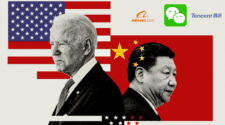WeChat has become a giant in mobile apps, changing how digital platforms work. Starting as a simple messaging app, it has turned into an all-in-one tool for Chinese life. With over a billion users every month, WeChat shows its massive reach and importance in China.
WeChat: The Evolution from Messaging App to China’s Essential Super App
The Rise of a Digital Giant
WeChat launched in 2011 by Tencent, first called Weixin, and quickly became popular in China. It grew from just a messaging app to a multi-functional super app by adapting to what users wanted. Now, WeChat offers many services, making it an essential tool for millions.
A World of Features
WeChat’s success lies in its wide range of features. Besides messaging, it supports e-commerce, letting users buy a vast array of products and services. WeChat Pay, its payment system, has changed digital payments, making transactions easy for groceries, transport, and more.
WeChat is also key for social interactions. With WeChat Moments, users can share updates and photos. For professionals, Enterprise WeChat provides tools for business communication and collaboration.
Mini-Programs: Driving Growth
A big part of WeChat’s success is its Mini-programs. These small apps within WeChat let businesses reach customers easily. From retail and food delivery to healthcare and education, Mini-programs have changed how people interact with brands, creating a lively marketplace.
Mini-programs have made users spend more time on WeChat, offering businesses a huge consumer base.

WeChat Pay: Leading Mobile Payments
WeChat Pay is a major player in China’s mobile payments. Its wide acceptance and strong security have promoted a cashless society. From street vendors to luxury stores, WeChat Pay is the go-to payment method for many consumers.
The Super App Phenomenon
WeChat fits the definition of a super app—a platform with many services creating a self-contained digital world. This setup reduces the need for multiple apps, simplifying users’ digital lives.
The super app model is catching on worldwide. Apps like Snapchat, TikTok, and WhatsApp are expanding their features. WhatsApp, for example, is exploring ticketing and e-commerce, while X (formerly Twitter) aims to add banking features.
Beyond Communication: WeChat’s Impact on Society
WeChat is more than just a communication tool. It is now a vital part of Chinese life, influencing how people interact, shop, and share information. WeChat offers a smooth platform for social connections, commerce, and information sharing. This has led to new social behaviors and norms.
Mobile payments through WeChat Pay are a big part of this change. They have helped China move toward a cashless society. This shift has made transactions easier and increased financial access, especially in rural areas with limited banking services. Additionally, WeChat’s group chat features help people connect with others who share their interests, fostering a sense of community.
Challenges and Opportunities
While WeChat has changed the digital world, it also brings challenges. One major issue is data privacy. WeChat collects a lot of user information, so balancing privacy with the need for data-driven innovation is crucial.
WeChat’s dominance in China also raises concerns about competition. It is important to ensure other tech companies can compete fairly to avoid anti-competitive practices.
Despite these challenges, WeChat has great potential to drive innovation and social change. As technology evolves, WeChat can lead in areas like augmented reality, artificial intelligence, and blockchain. By using these technologies, WeChat can improve user experiences, create new business opportunities, and contribute to the digital economy.
Global Implications
WeChat’s success has inspired interest in the super app model worldwide. Both tech giants and startups are looking to replicate its success in different markets. Cultural and economic factors may affect how super apps are adopted in other regions, but the core ideas of convenience, integration, and user-focused design apply everywhere.
As the global digital landscape changes, super apps will likely become more common. By studying WeChat’s success, companies can learn how to build platforms that meet the needs of connected, demanding consumers.
Conclusion
WeChat’s evolution from a messaging app to a super app is a remarkable story of digital innovation. Its ability to adapt and meet user needs has made it a cultural and economic powerhouse in China. As super apps become more popular globally, WeChat serves as a model for creating comprehensive and engaging user experiences.





